How I use Notion to learn and create more effectively
I use Notion.so to make sure I remember what I read and to help me learn and create more effectively every day. Here is a dive into my system.

If I use many apps everyday, some are definitely keystone to my productivity. As I mentioned in this post a few weeks ago, one of them is Notion, an “all in one workspace to write, plan collaborate and get organized”. After having used it for ~2 years, I built, inside this app, a system that allows me to be more creative everyday.
What is Notion ?
Notion is an “all in one workspace to write, plan collaborate and get organized” that I discovered around mid-2018. Incredibly modular, Notion is whatever you want to make of it. The tool is designed to follow your imagination and help you build the system you need without having to learn how to code. In the app you could plan your upcoming book, write down your lessons for university, outline and organize the posts for your blog and make notes on books that you read... or, like me, do all of the above.
In this post, I’ll dive into some parts of the personal system I recently implemented in Notion, specifically to improve the way I learn and to create. More than just on the tool, I’ll also dive on the philosophy and the mindset behind my system: why I built it like this, what it brought me thus far and how useful I think it will be in the future.
A dive into my personal system with Notion
The app in itself is not hard to use. In fact, it’s maybe the simplicity of the design that will overwhelm you at first. But, Notion is like LEGO blocks, you won’t know what to do with it until you actually start making something.
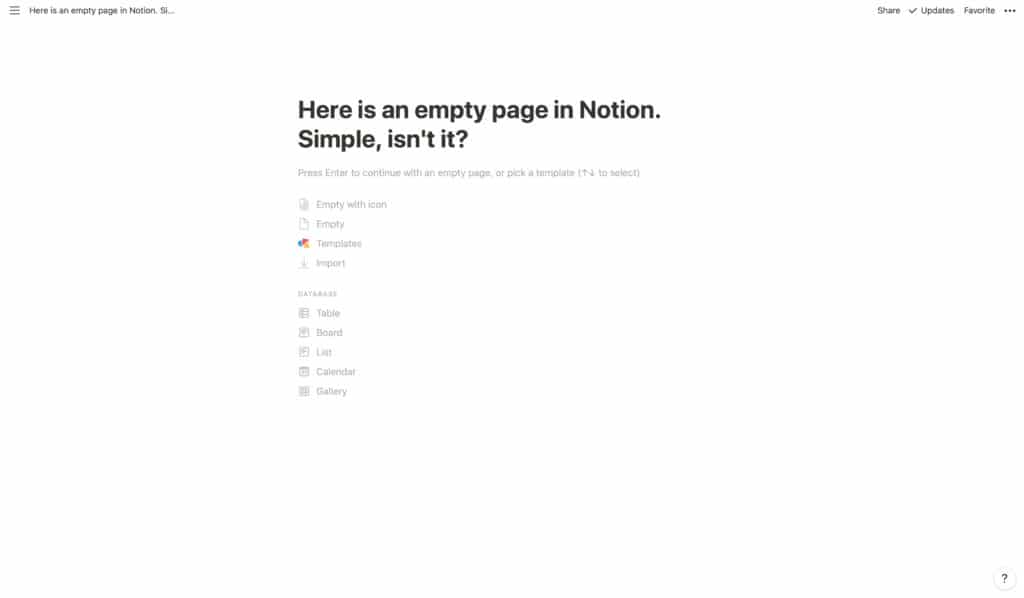 An empty Notion page with the text "Here is an empty page in Notion. Simple, isn't it?"
An empty Notion page with the text "Here is an empty page in Notion. Simple, isn't it?"
How I imagined my system
For each of the following sections, I’ll first introduce you to the problem I had, then the solution I found and explain why it worked for me.
I built my Notion setup on top of lessons I learned from some of the most influential books I read, the main one being: having a single place of truth, a system where you can put and retrieve things easily. With its design and the way it works, Notion helped me build this system in my mind first; see how things could connect. By then, all the areas and activities I use to cognitively separate started converging into one: the person I want to become.
“We become what we behold. We shape our tools, and thereafter our tools shape us.” — Marshall McLuhan
Now, without further ado, on to the system.
Remembering what I consume
As I mentioned in my Personal Mission Statement, reading, learning, watching videos or listening to podcasts is what I do on a daily basis. I’m curious and I like to get news content under my teeth, but... consuming is not the end goal. I want to effectively remember what I learn and take the most out of the valuable things I consume. That’s how Notion comes into action.
In Notion, I built a library with content (books or else) and effective ways to retrieve them (through a database of tags and authors) and take the most out of them (quotes).
Sources Database
In the source Database, I track every valuable resource that I consume, divided in categories/types: books, speech, video, movie, song, TV Show, articles or podcasts.
Every entry has a set of properties: status, author, featured character, other valuable resources referenced/suggested and the quotes it contains. As an example, here is the entry for one of my latest read, Outliers by Malcolm Gladwell.
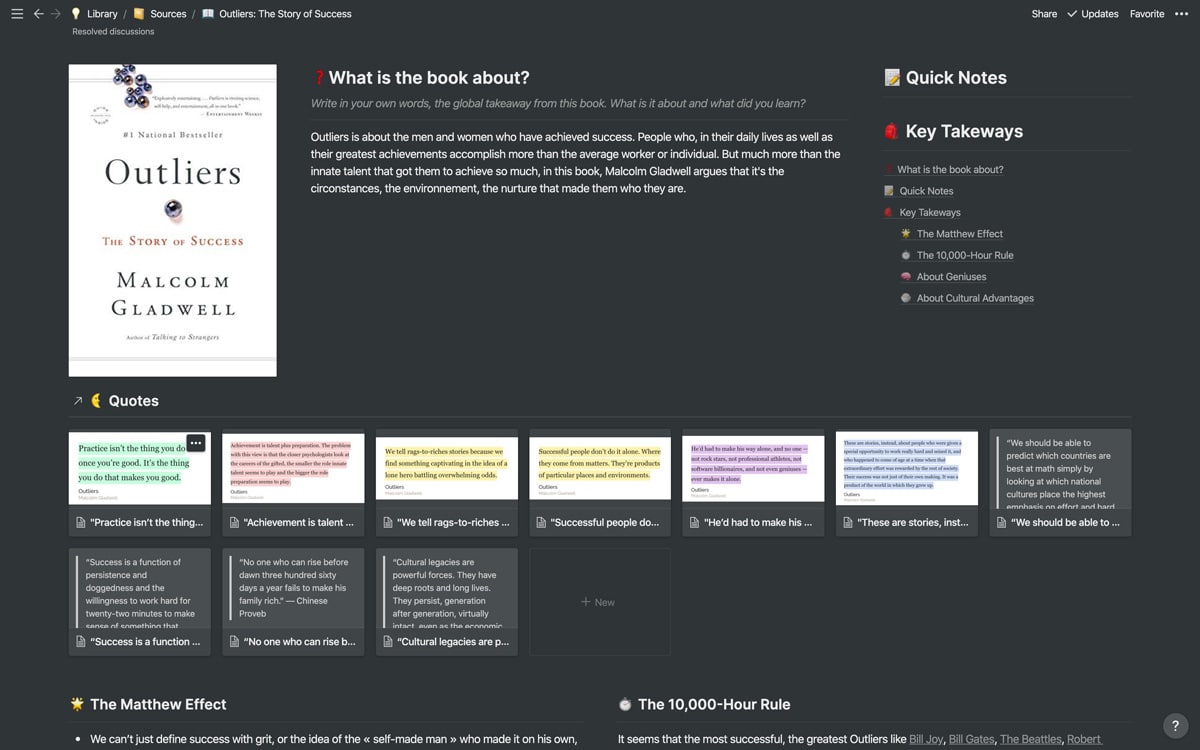 One of my "source" entry for the book Outliers by Malcolm Gladwell. The page contains: a cover of the book, texts including a summary written by me as well as the quotes from the books.
One of my "source" entry for the book Outliers by Malcolm Gladwell. The page contains: a cover of the book, texts including a summary written by me as well as the quotes from the books.
Usually I’ll take notes when I find something interesting and let Readwise resurface for me the interesting quotes I marked on my kindle.
People Database
Linked to the Sources Database but not only, the People Database is about the authors, the celebrities, people from my daily life and even fictional characters I come across and I want to remember. Someone can end up featured in my database if:
- They wrote a book / created a video featured in the Source Database,
- They recommended me some resources (like a book to read),
- They are featured in the quote database (even if I don’t have a source),
- They instructed or were featured in an online course I follow,
- They gave me valuable feedbacks on a post, article or newsletter I created,
- And many other reasons.
My idea with this database is to be able to remember names, faces and people better. Be able to link ideas better and when consuming something new, know if it wasn’t my first encounter with its author.
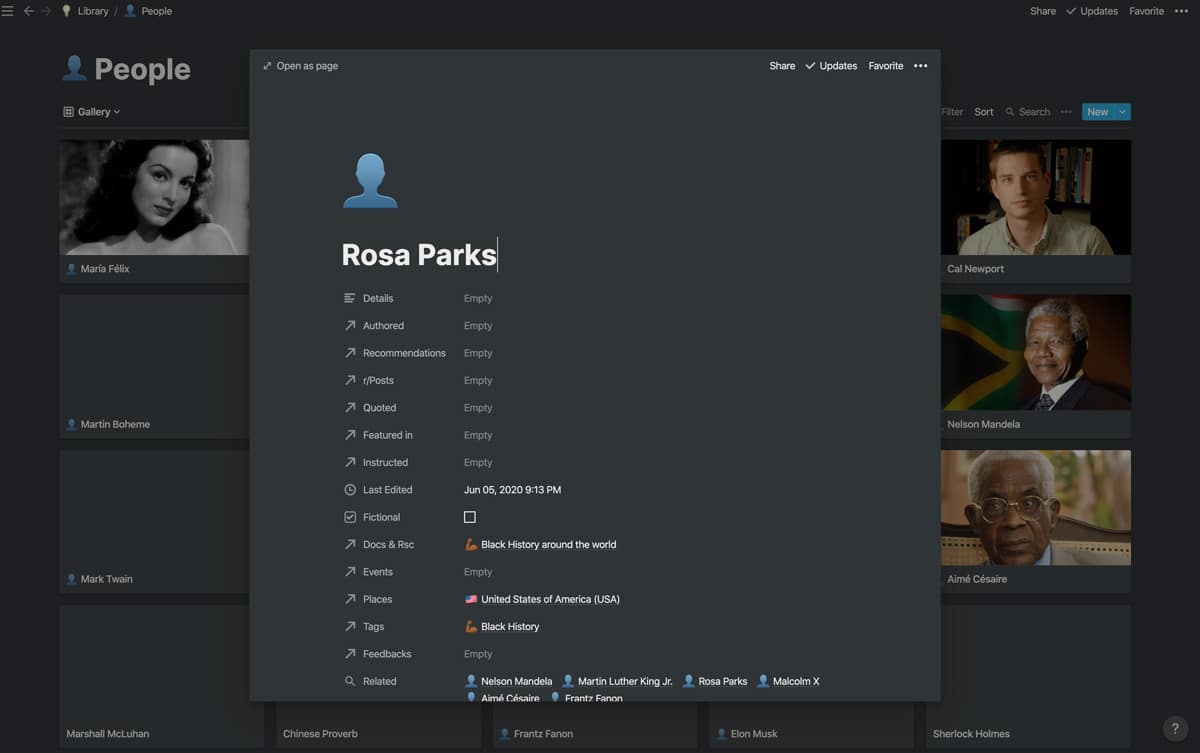 An example of a "People Database" entry with a page on Rosa Parks.
An example of a "People Database" entry with a page on Rosa Parks.
Practical use: if I have to write an essay on Rosa Parks tomorrow, I’ll have a bunch of ready-to-use resources at arm’s reach.
The Tags Database
There is nothing much to say about it except that it’s core to all of my other databases, including the newsletter/posts ones. This database is the glue to link everything I learn, create and organize. Here is an example:
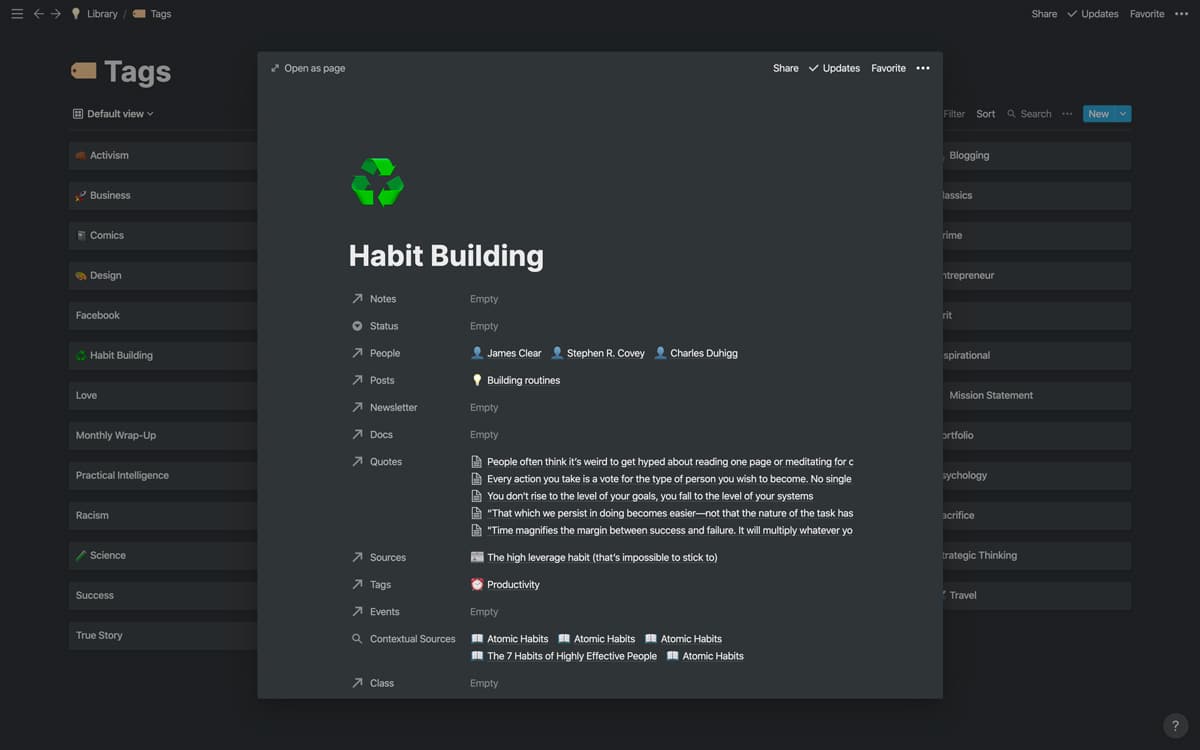 My Notion Tag Database
My Notion Tag Database
These three databases, in addition to the Quotes one are keystone to everything I learn, but what about what I create?
Creating more effectively
Well, in fact, the “creating front” is not that different, nor really separated from the learning one. I have a database for all of my past, present and future posts (same for the newsletter).
Original problem: I would never stick with a blog schedule because everything was dispersed, I never knew what to write, when or where. It was confusing and I was always forced to rely on motivation.
Solution: Using the Kanban system of Notion (originally I started organizing my blog life that in Zenkit), and having a single place of truth for what I create and my ideas.
But it’s not just that. Nowadays it’s easier for me to create because I directly link it to what I learn / come across and my communication channels. Let’s take the example with a Monthly Wrap-Up.
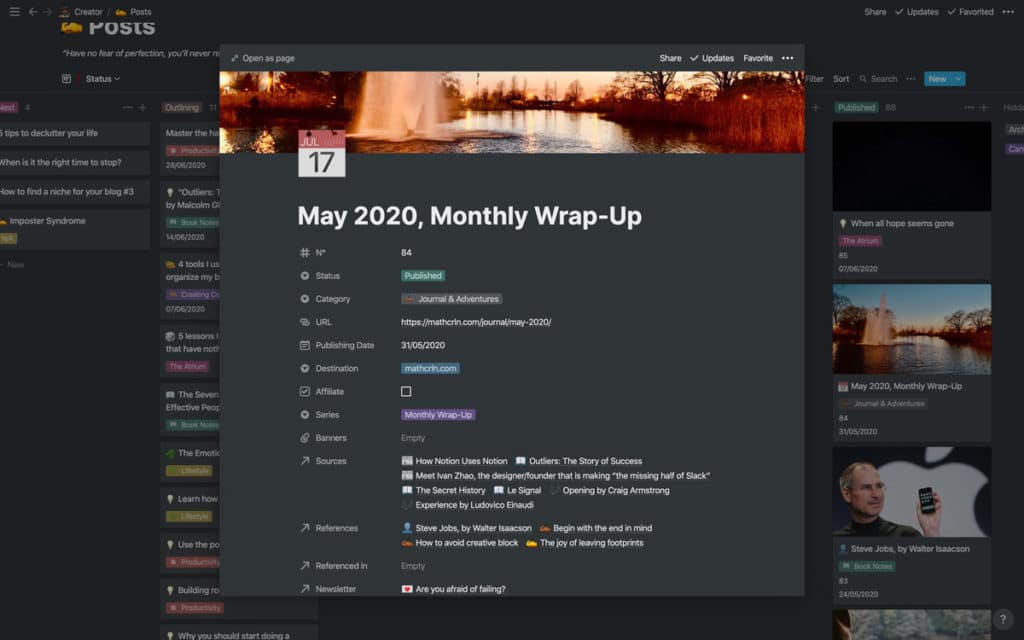 One of the posts I wrote in Notion
One of the posts I wrote in Notion
In it, I have everything I need. I know all of the sources I’ll reference (because I enjoyed them during the month), I know all of the previous posts I’ll include as well (those written during the month) and I know in which newsletter(s) I referenced this post. Ultimately, I’ll probably create a Social Media database to track in which posts & when I share what, but that’s not my priority right now.
I make my writer’s job easy by finding the right resources, outlining in advance and using the right templates (which is the topic of the next post), then sitting down every morning to write, without the hassle.
I’ll talk more extensively about this system in an upcoming post, but this might give you an idea. Don’t hesitate to tell me if you would like that or if you have specific questions in the comments.
More resources on Notion
I picked your interest about Notion and you’d like to know more? Don’t worry I got you covered, here are some resources for that:
Videos & Posts
Notion website is already a goldmine, with wikis and informations about whatever you could wish to know. You can even try out the tool without having an account. Other than that, these videos have particularly inspired and influenced my system:
- How I use Notion! *as a student* | studycollab: Alicia
- My Favourite Note-Taking App for Students - Notion (2020) - Ali Abdaal
- The Most Powerful Productivity App I Use - Thomas Frank
- How I use Notion as a Resonance Calendar - Ali Abdaal
- How Notion Uses Notion - Notion Team
Communities
There are many communities, in many languages, with people sharing tips and ideas.
- Notion Made Simple (Facebook Group)
- Notion for Students (Facebook Group)
- Notion en Français (Facebook Group)
Philosophy
Lastly, you don’t have to read it, but here are some fascinating posts I read about the philosophy behind Notion: how and why the founders built the products and what they try to achieve, what drives them.
-Meet Ivan Zhao, the designer/founder that is making “the missing half of Slack” - Invision Blog
In the meantime, don’t forget that you can ask me any questions, I’m also open to make some of systems publicly available for you to duplicate. In the meantime, have fun playing around with it!
Let’s chat
Have you ever used Notion or a similar tool, if so what did you think of it? Would you like more posts on how I use Notion in my system (with tips and actionable templates to build your own) ?